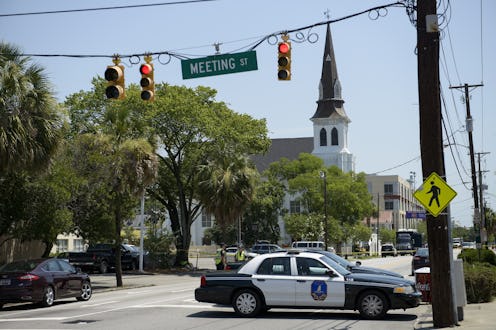News
Could Shooter Dylann Roof Get The Death Penalty?
Authorities arrested the leading suspect in the mass shooting at a historic black church in Charleston, South Carolina, Thursday morning. Federal justice officials confirmed that Dylann Storm Roof was taken into custody after being discovered in a traffic stop in Shelby, North Carolina — about 250 miles away from the church where he allegedly opened fire. Now that he's in custody, many are wondering if Dylann Roof could receive the death penalty for his horrific hate crime that left nine people dead, including the church's pastor.
"I can confirm that there is a suspect in custody," U.S. Attorney General Loretta Lynch told reporters Thursday. Charleston's mayor, Joseph P. Riley Jr., added in a statement to the media: "That awful person, that terrible human being ... is now in custody, where he will always remain." (Update: Roof has been charged with nine counts of murder, and possession of a firearm.)
Hours before Roof's arrest, both local and federal authorities labeled the mass shooting as a hate crime, which means the 21-year-old South Carolina resident could receive even harsher punishment for his crimes. A hate-crime investigation has been opened by the Justice Department’s Civil Rights Division, the F.B.I., and the United States Attorney’s Office for South Carolina alongside local and state probes. Although Roof's motivation behind the massacre isn't confirmed, authorities said Thursday it certainly appears racially motivated — and that Roof targeted the Emanuel AME Church because of its noted history as a black church.
While South Carolina has the death penalty, it's one of five U.S. states that doesn't have any hate crime laws, as ThinkProgress pointed out. Hate crime laws typically heighten penalties and increase sentences against perpetrators. However, that most likely wouldn't matter too much in Roof's case, considering the gravity of his crimes.
But there's a good chance Roof will be prosecuted under the jurisdiction of the federal government, depending on the findings of the Justice Department's civil rights investigation. Following the passage of the 2009 Matthew Shepard and James Byrd, Jr. Hate Crimes Act, federal agencies can now investigate and prosecute hate crimes, regardless of state laws. As Benjamin B. Wagner, U.S. Attorney General for the Eastern District of California, explains in an article on the Office of State Attorneys website:
The Shepard Byrd Hate Crimes Prevention Act increased penalties for violent hate crimes, broadened and simplified federal jurisdiction, and for the first time recognized certain violent acts directed at individuals because of their actual or perceived sexual orientation as federal hate crimes. The Shepard Byrd Act provides investigators and prosecutors with important new tools to deploy against hate crimes.
The 2009 federal hate crime law does not carry a death penalty statute — the Senate proposed a death penalty amendment, but it was removed by the House. Other federal civil rights statutes do permit prosecutors to seek the death penalty in murder cases stemming from a hate crime based off a person's race, yet it's likely federal prosecutors will defer the case to the state jurisdiction. Lynch confirmed on Thursday that her office is looking into whether or not these hate crime charges should be brought against Roof.
So, the death sentence is still a possibility for Roof, as well as a punishment of life imprisonment. The seriousness of the crimes do merit the death penalty under South Carolina's homicide laws.
The Southern Poverty Law Center, which tracks hate crimes and hate groups throughout America, added in a statement on Thursday that the shooting at Emanuel AME Church is an "obvious hate crime" that represents domestic terrorism — not just a one-off mass shooting. "Since 9/11, our country has been fixated on the threat of Jihadi terrorism," SPLC President Richard Cohen said. "But the horrific tragedy at the Emmanuel AME reminds us that the threat of homegrown domestic terrorism is very real."
Images: Getty Images (1)
